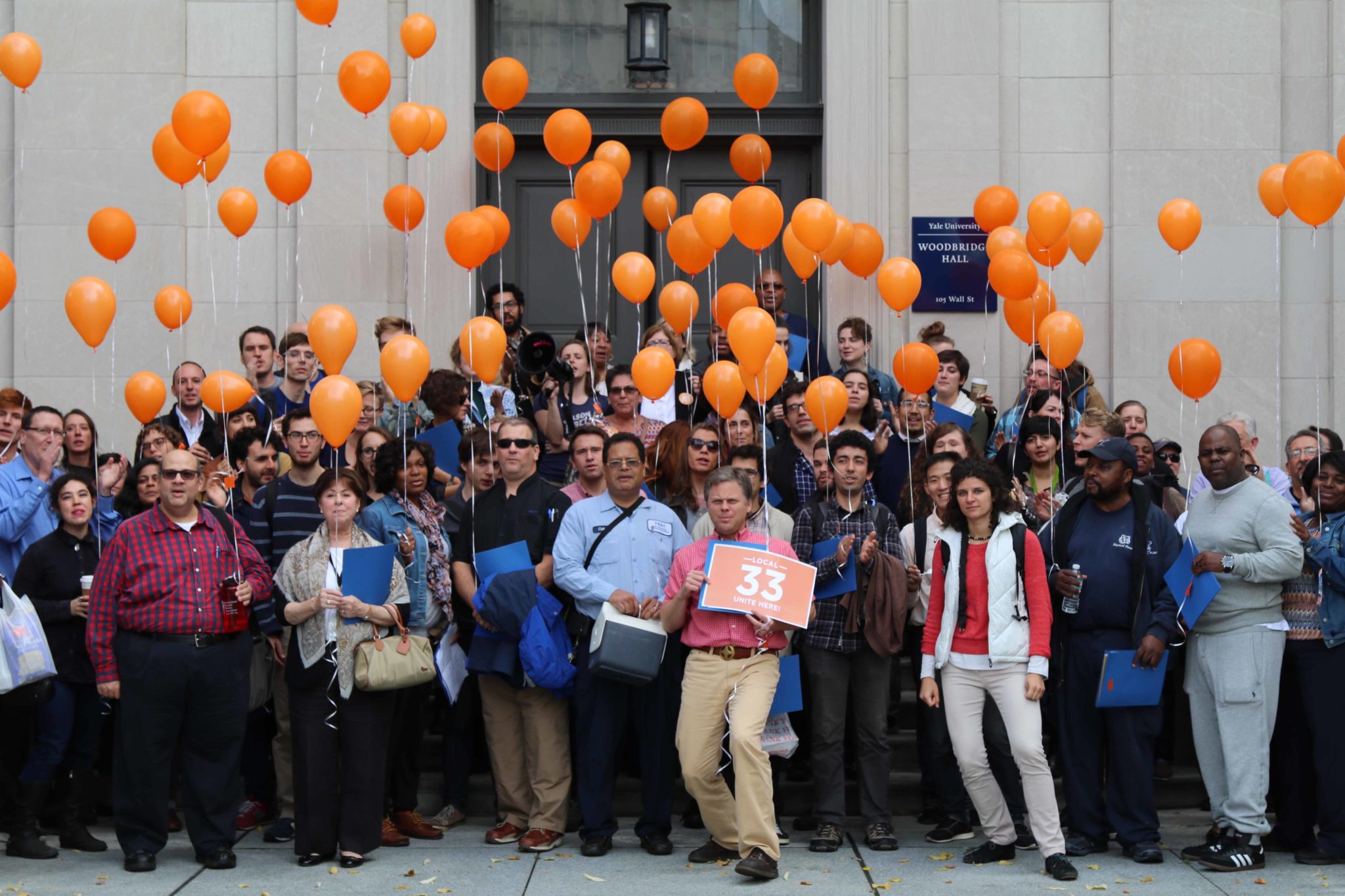
Dozens of supporters of Yale’s unrecognized graduate student union Local 33 rallied in City Hall on Wednesday night, cheering and waving picket signs alongside members of the University’s labor unions.
But despite the fanfare, the future of Local 33 remains murky. The union is locked in legal disputes with Yale over its election strategy. And more broadly, the National Labor Relations Board decision allowing graduate students to unionize could be overturned once President-elect Donald Trump takes office on Jan. 20, labor experts say.
The NLRB ruled in August that graduate students at private universities have the right to unionize, reversing a decade-old precedent. Soon after the decision, Local 33 filed for union elections in 10 departments in the Graduate School of Arts and Sciences.
Yale challenged that election strategy — a novel approach that no other graduate student union has ever attempted — in labor court in Hartford.
Now, both Yale and Local 33 are waiting for NLRB Regional Director John Walsh to decide whether the departmental elections can proceed.
The head of the NLRB’s Hartford office, Michael Cass, said on Tuesday that he does not know when Walsh will reach decisions on the departmental election petitions. After hearings ended on Oct. 7, Local 33 withdrew its petition for the Comparative Literature Department for reasons that remain unclear, reducing the number of petitions from 10 to nine.
“It’s a 20-day hearing, there’s a lot to go through,” Cass said. “The director’s emphasizing to both parties that he wants to make the right decision, so it’s not something that you can turn around on the dime and do. But we are actively working on it, and as soon as we can get it out, we’ll get it out.”
But even if Walsh rules in favor of the union, the legal disputes between Yale and Local 33 may only be beginning.
According to Cass, the University could challenge the decision by filing a request for review with the full labor board in Washington, although the NLRB typically allows union elections to proceed while such reviews are pending.
“You could also have a situation where the union won all the elections and the University decided, we’ll just deal with what we have now, we’re not going to pursue this,” Cass said. “They can really decide to do as they see fit.”
Yale spokesman Tom Conroy told the News that the University would review the regional office’s decision on the Local 33 petitions “when it comes,” and comment on its next steps only at that stage of the process.
Another potential response for Yale would be to challenge the NLRB’s August decision. The labor board has changed its position on graduate student unionization three times in the last 16 years — most recently with the decision this summer. And in interviews with the News, labor experts said that under Trump’s administration the NLRB will likely change course once again.
“It’s very much on the endangered species list right now among board decisions,” said Dan Bowling, a senior lecturer at the Duke University School of Law. “It’s likely that a Trump administration will in due time overturn the [August] decision and rule that graduate students are not entitled to collectively bargain.”
According to Bowling, the NLRB has gone back and forth on graduate student unionization partly because the issue touches on deeper legal questions about the types of workers who belong within the jurisdiction of the labor board. Historically, the Democratic Party has worked to broaden the scope of the 1935 National Labor Relations Act — a landmark law that guarantees the rights of certain types of workers to unionize — while Republicans have tried to limit it, Bowling said.
There are currently two vacancies on the NLRB, whose five members are presidentially appointed and must be confirmed by the Senate. And because the Senate invoked the so-called nuclear option in 2013, eliminating the 60-vote threshold for certain confirmations, Trump should have a relatively easy time confirming his NLRB picks, according to New York University School of Law professor Samuel Estreicher.
If the NLRB does reverse the August decision, it would not be the first time that presidential politics have reshaped the legal landscape for graduate student unionization. In 2000, the NLRB voted to permit such unions in response to an election effort by students at NYU. But after then-President George W. Bush ’68 made his appointments, the NLRB reversed that decision in 2004.
In the wake of the 2004 reversal, NYU cancelled an existing labor contract with its graduate students. A similar fate could await Local 33 if the NLRB changes the decision again following successful elections and contract negotiations at Yale.
“Yale would have a variety of options — it could withdraw recognition of the union, it would probably render the contract null and void,” Bowling said. “It would be a little bit of a mess.”
Still, Local 33 Chair Aaron Greenberg GRD ’18 said he does not expect Trump’s presidency to affect graduate student unionization at Yale.
“When he undoes Obamacare, I don’t expect Yale to reverse its progressive health care policies; when Trump attacks immigrants, Yale isn’t going to help him on its campus,” Greenberg said in an email. “We expect to win our union elections, negotiate fair contracts and have both Yale and Local 33 live up to and honor the terms irrespective of anything Trump does.”
In his statement, Conroy said higher education is “not well-served” by the unpredictable status of graduate student unionization. Yale has consistently opposed union efforts since the precursor to Local 33, the Graduate and Employees Student Organization, formed on campus in the 1990s.
“Yale’s position on graduate student unionization has not changed, and the University will continue to monitor national developments,” Conroy said. “Yale welcomes a robust and open debate on the pros and cons of graduate student unionization in which all voices are heard, free from intimidation.”
GESO was rebranded as Local 33 last March.







